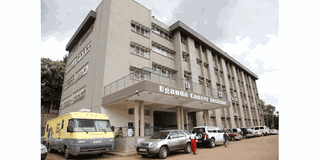Govt demands quality at Uganda Cancer Institute

The Uganda Cancer Institute in Mulago National Referral Hospital. PHOTO/FILE
What you need to know:
- Health minister Ruth Aceng tasked the board to address accommodation and feeding challenges.
The new board of the Uganda Cancer institute says it aims at carrying out reforms that resonate with its recent accolade as the regional centre of excellence for treating cancers.
Speaking at the swearing-in ceremony for the new board last Friday, Prof William Bazeyo, the new board chair, said the tasks include; improving patient management, deploying the most recent protocols for managing cancer, recruiting well-trained personnel and reducing the number of patients reporting late to the cancer institute for treatment.
“Uganda Cancer Institute was voted as a centre of excellence for East Africa because of what we were doing compared to other countries and for us to live that dream since we were given that honour, we need to do certain things,” he said.
He said they intend to decongest the cancer institute at Mulago hospital by increasing public awareness about cancer prevention through outreaches, completing and equipping the regional cancer centres in Gulu, Arua, and Mbarara for screening.
Mr Bazeyo said they have co-opted technical people from different organisations to help the institute fill some of gaps such as risks, litigation, human resource development, and resource mobilisation.
He said instead of taking patients for specialised treatment to Bangkok and India, funds should be used to improve the infrastructure at the cancer institute to enable both the rich and poor access quality healthcare.
Health minster Ruth Aceng, who inaugurated the new board, tasked it to ensure that they implement tasks, ensure equitable access to drugs and also address accommodation and feeding challenges in hospitals.
Dr Aceng said drugs are meant to treat both the rich and poor patients, adding that it is strange that the poor cannot access the drugs yet cancer is the leading cause of morbidity in the country.
The minister wondered whether the increasing number of patients is as a result of improved surveillance or prevalence of the disease.




